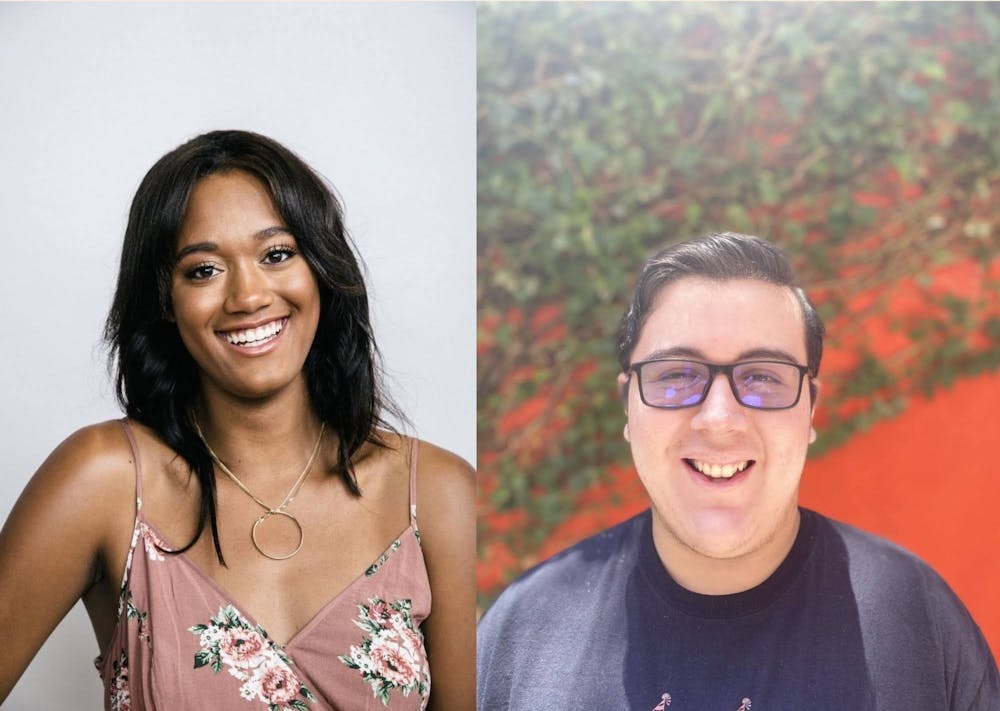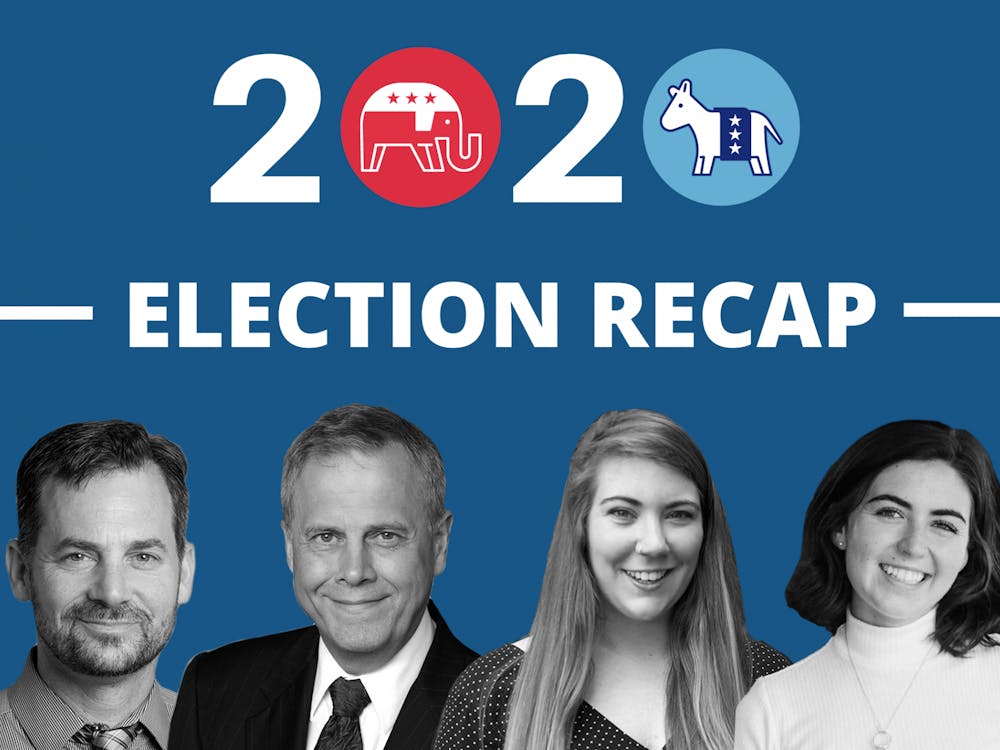When Miguel Navarro woke up on the morning of his last day of in-person high school, something felt off.
“The sky was saying something,” Navarro said.
Shortly afterward, stay at home orders were announced and Navarro realized he would be finishing his senior year online.
Isolation can be easily felt due to the COVID-19 induced shift to online classes. It can be hard to make connections with people you only ever see through the pixelated rectangles of Zoom.
Although returning students can take comfort in the connections they already made on campus, freshmen at UP were left floating in a digital pool, often without the satisfaction of closure on their high school experience.
Now, freshman class Senators Miguel Navarro and Nevaeh Bray are taking on the challenge of leading a class online, hoping to still be able to work towards the inclusion of minority groups on campus, as well as expanding mental health resources, all while bringing the freshman class together.
Despite the removed start to the school year, Navarro and Bray have found ways to overcome the distance faced in remote learning. For Navarro, this included joining the class of 2024 Discord server and for Bray, it was bonding with her teammates on the volleyball team. The common struggle of starting college online has also reportedly given the freshman class something to bond over.
“There’s definitely connective tissue within the freshman class,” Bray said. “Now we’re starting a brand new four years, all in the same position, not really understanding what’s going to happen or where the future is going to take us.”
Despite the challenges of school being online, Navarro and Bray remained inspired to take on the senator positions and are motivated in keeping up with their roles.
Bray’s passion and motivation to take on this position blossomed after her experiences with the Black Lives Matter movement last summer. Bray attended protests in both her hometown of Corvallis as well as Portland.
“I kind of started getting used to being in a group and leading a group,” Bray said. “When I found out about ASUP and how they had positions, I knew I wanted to try to join because I like advocating for people.”
Similarly, Navarro was inspired by his desire to advocate for others and create change in a community.
“I wanted to help inspire change and I wanted to make a real change for the class of 2024,” Navarro said. “There are issues we need to address in terms of the administration and in terms of different things that are happening on campus.”
The inspirations behind their reasons for joining the senate are reflected in what Navarro and Bray were each working on during the fall semester.
Being interested in politics, Navarro is a political science and history double major. Navarro hopes to follow a career path into politics, possibly as a diplomat or a position involving foreign affairs.
Navarro’s exposure to politics began mostly with his parents yelling at the news, which was the case when George W. Bush invaded Iraq, he recalls. However, within the past five years, Navarro had his own light bulb moment concerning politics.
“It was when Trump announced his candidacy for presidency in 2015,” Navarro said. “Since then, I like studying my history...that’s what made me want to get more into politics.”
While Bray is currently on the pre-health track, which is a topic that has always fascinated her, she also has a passion for politics and is leaving doors open to explore a more political science or even pre-law oriented education.
“Recently with everything going on with politics and Black Lives Matter...I think the poly sci route was just something that recently seemed interesting,” Bray said.
For Navarro and Bray, working hard for a community does not stop at the edges of campus. Giving back to the wider community and helping people in need is a commonality for these two.
Knowing the possible toll on mental health that can be created from the pandemic along with social and political unrest, Navarro worked with Active Minds and the Health and Counseling Center in hopes of creating a suicide prevention module that students could take on Moodle.
Navarro also worked with Diversity and Inclusion Coordinator Yuri Hernández Osario to expand participation of LGBTQ and BIPOC community members in a mentorship group.
Bray’s work goes in the same direction of reaching out and providing platforms for minority students on campus. This past semester, Bray worked with Black Student Union (BSU) president Sharif Morton to discuss possible ways to use ASUP to guide Black and minority students.
Relating to her participation in protests over the summer, Bray also wants to find a way to get a group of UP students involved in protests that have been happening in the Portland area.
Sitting on the DEI committee — a group separate from ASUP that she was nominated for — Bray says she has close contact with administration that she can also use to her advantage for her work in the senate.
“I can use that as a mediator between them and ideas that we’ve been having and try to figure out how to make it all work,” Bray said.
Alongside their individual projects, Navarro and Bray also have more routine duties as class senators. They both attend weekly meetings to hear speakers address the senate or to hear others testify. The two also meet with fellow ASUP senators who guide them and answer any questions they may have.
Having speakers come to the senate meetings allows Navarro and Bray to ask some questions that are really on their minds. During one meeting, Navarro started to get an exciting taste of what working in politics could be like.
“I felt like Kamala Harris roasting Brett Kavanaugh,” Navarro said. “Father Donato came to testify about COVID plans for next semester, and I was giving him the tough questions that my constituents had and that I had.”
On their own time, Navarro and Bray also reach out to the freshman class. Navarro uses his access to the class Discord server to write reports on what happened in the meetings so his classmates can keep up with what is going on. Bray uses an Instagram account for her campaign to get feedback from classmates as well as answer questions.
Navarro and Bray also meet together once a week to collaborate on projects they’re working on and figure out how they can help each other.
Navarro and Bray share many similarities, which allows them to work well together. Oftentimes in meetings, the two will begin talking about their senate rolls and eventually end up talking about their shared passion of politics.
“We’ll discuss the agenda of what we’ve been working on to find different projects, but then we always end up spiraling off and diving into politics and history,” Bray said.
When going out into the community, Navarro makes sure that if he sees someone on the street who appears to be homeless or has any other indicator that they need help, he will buy that person a meal to ensure they have something to eat. Bray also follows this philosophy in her community.
Navarro and Bray find ways to give back to the community each day. Through their positions as class senators, they work to make changes that will lead to a more positive future. In a time where it can be easy to feel isolated, Navarro and Bray have made their presence known and are reaching out to try to connect to as many of their classmates as they can, even online.
Laura Heffernan is a reporter for The Beacon. She can be reached at hefferna23@up.edu.








